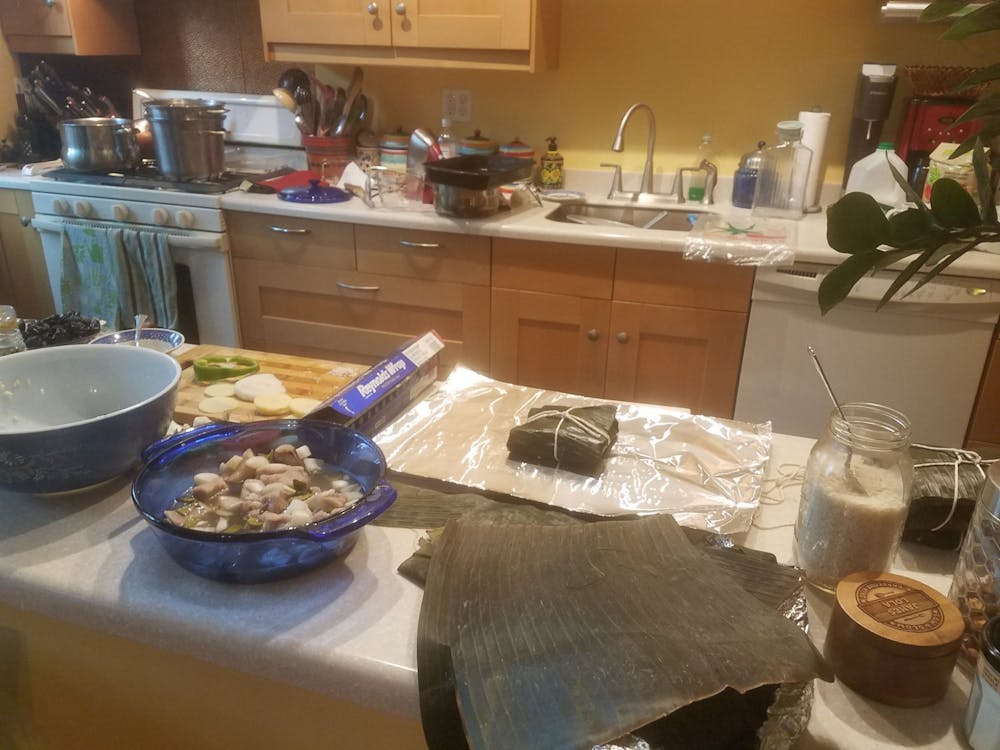
Quarantine has, I assume, pushed us all to some kind of edge, whether it’s manically honing dozens of hobbies and skills for a sense of productivity, or biding your time by lazing around the house and having regular existential crises, or maybe oscillating between the two. I personally tend more toward the “biding my time” option, but thankfully I’ve also been able to hone a skill or two here and there, particularly cooking. And a few weeks ago, I was able to cross off one of the things that’s been on my cooking bucket list for years.
For background, I have some Nicaraguan heritage from my dad’s side. A popular, traditional dish in Nicaragua is the nacatamal (think of the more familiar Mexican tamal, and then multiply it by five in terms of its size and heartiness). I’ve only eaten nacatamales two or three times in my life, since they’re incredibly laborious and time-consuming to make, and they’re typically reserved as an Easter dish or a Sunday breakfast for the whole family. But they’re delicious, and I had always thought cooking them would make me feel more in touch with that part of my identity, thus their long-standing place on my list.
One Saturday last month, my parents and I found ourselves roaming the aisles of a Mexican grocery store in New Jersey, where we were taking a socially distant day trip away from New York City. While I was walking through the frozen aisle, I saw they had frozen banana leaves. (While Mexican tamales are cooked in corn husks, nacatamales are cooked in banana leaves.) I, mostly jokingly, said to my dad that we could buy them and make nacatamales.
He didn’t say no, like he had all the other times I’d asked if he would help me make them. So I suggested it again, for real this time.
Maybe you would call it impulsivity or indulgence, maybe it’s healthy spontaneity, maybe it’s Maybelline, but something that night made us say, “Why not?” and forget just how much we were signing up for. We bought the banana leaves.
We didn’t have an idea of when I would actually make them, other than vaguely “soon.” But, for whatever reason, my father woke me up that Thursday around 11 a.m. by saying, “Time to get up. You’re making the nacatamales today. I marinated the pork for you.” And then off to work he went, leaving me and his recipe to ourselves to figure this thing out. (See the end for the full recipe.)
Being woken up and unexpectedly given a laborious six-hour task was not necessarily what I wanted, but it was what I got. I left my bed, went downstairs and drank some coffee to prepare myself. Following the recipe, I boiled the corn flour, mashed potatoes, lard and sour orange juice to make the masa (dough). I called my dad because I thought I’d already messed it up. He told me to keep going.
So I stuffed big balls of masa with pork, peppers, onions, potatoes, tomatoes, mint, capers, olives, rice and prunes (probably sounds weird, but truly a perfect combo). I wrapped each nacatamal in a banana leaf and foil, which was a whole debacle because banana leaves, I learned, break very easily. Then I tied them up with twine and put them in a couple pots of boiling water to cook for four hours. I checked on them every 10 minutes because I was so anxious for them to turn out well, and I sweated more than I’d like to admit from all the steam.
Finally, I took them out and put them on a platter to cool before we unwrapped them and ate them for dinner. (A side note: How people get up at 4 a.m. so they can make these for breakfast is beyond me, but go off, I guess, if you’re that type of person.)
The nacatamales ended up being delicious and totally worth the effort, especially for a first attempt. And if you’re wondering whether I’ve just turned into a food columnist or if there’s actually some bigger point to this long-winded cooking story, it’s the latter. (I could never replace Frank Guerriero’s iconic Food for Thought anyway.)
First of all, for a procrastinator like myself, this was a helpful exercise in simply getting something done right away. Secondly, it made me question the importance of time, or really, of timing. If I go with tradition, I should’ve made these for breakfast or for Easter. Or I should’ve made them for a big family gathering, which isn't something we can safely do right now. I presumably should've at least had some special reason for cooking the dish, but I didn't.
But I had been dismissing the opportunity for years, telling myself that a certain occasion wasn't the right one, that I didn't have the time or that I wasn't an experienced enough cook yet.
As I said earlier, quarantine has provided me with ample time and a desire to get better at cooking, so when was I finally going to do it, if not now? And why is it so hard for us to let ourselves have special, nice things at otherwise ordinary times? Can special things not turn those ordinary times into special times?
My grandfather (on my mother’s side, not my father’s) is a wonderful cook, and he has a great appreciation for good food. When we come over for dinner or go out to eat at a restaurant, he has a habit of calling the food not simply “tasty” or “delicious” but “very special.” Other than from him, “special” isn’t a word I often hear applied to food itself; it always seems to describe an occasion that warrants a celebratory nice meal.
But, as I’ve experimented more with cooking and hit on some tasty creations, I’ve begun to understand why that word seems so fitting to describe some foods. The experience of making and/or eating something, and doing so thoughtfully and with love, is extremely rewarding and fulfilling and therefore special.
To end, I have a suggestion. I know that cooking is often daunting to college students because it seems time-consuming and difficult to do right. And there are always other food options readily available, which enables us to avoid it and put off learning. It definitely can be time-consuming and difficult. But maybe something amazing, something special, will come of you saying, “Why not?” So try saying it. Make something that sounds interesting to you, or dig up a family recipe no one’s made in a while. And, really, if you’re like me, what else are you doing in quarantine anyway?
Recipe for nacatamales:





